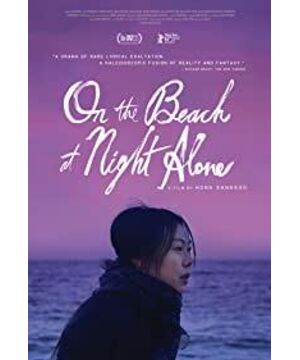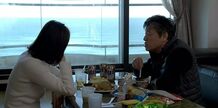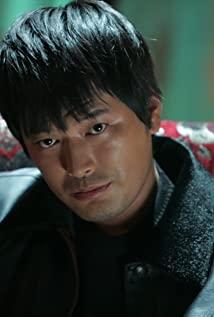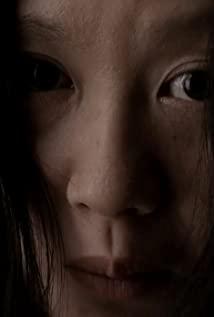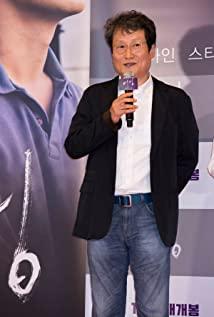The film is divided into paragraphs by a black screen and two white numbers. The length of the story before and after is not balanced, which is the real uncertainty of the director's intention. Yingxi Yemei's dark belted coat showed fish-belly white trousers. One second, she replied softly and said it was time to leave, but in the next frame, she stepped on the sand and gradually merged into the deep blue sea. The scrutinizing eyes wandered left and right, turning into the audience's perspective to search for Yingxi's shadow, and finally stopped at the deep vision of the man in black and Yingxi gradually disappearing; then the picture seemed to be focused and reappeared after the movie ended, and the camera was aggressively aimed at In the middle shot of the ripples in Yingxi's eyes, she moved sideways, and the camera moved backwards, drawing a panorama with dark red seats as the main color.
"The harder the separation, the better the connection will feel", this is the director's explanation of the film's use of segmented structure and differential photography. At first glance, the plot before and after the transition seems unrelated, but upon closer inspection, it is full of the fun of the play within the play: it was Yingxi who saw her loneliness in the story she was performing, or the past was originally a scene. The imaginary carnival, the black screen subtitles flashed like floating clouds, and the violin accompaniment was like catkins without roots. It is the end of a paragraph and the opening of another drama. The two long shots are based on the back of the heroine who travels far away, like a pair of affectionate eyes.
"Alone on the Beach at Night" is full of dramatic Hong-style push-pull shots, and the consistent mechanical operation is reflected in the prose and poetic texture of the film. The first shot of the film is a close-up shot of Yingxi turning her back, the pale outline of the character is hidden in the mist-like emanations, giving the illusion that she is alone in the busy city; The innocent face turned around suddenly, the camera pulled out a distance, and the friends beside her approached her intimately, but Yingxi's wandering eyes were still wandering. In other scenes, there is a slack panning mirror sliding over the empty gray tile and red wall, a simple pushing mirror close to Yingxi's crawling back and a wooden bridge covered with green grass, and Yingxi alone at a gentle speed. The mid-shot of the smoky humming and the side-reclining beach is gently drawn into the painting. "In such a beautiful scenery, a person will be more lonely", Young Hee looked at the continuous green of Hamburg.
From another angle, the mirror expression of the film can also be regarded as the eye of the beholder dyed in color. The heroine Yingxi is like a fish drowning in the deep sea, revealing her deep thoughts between friends and the dining table; the camera lens is like another pair of eyes watching on the scene, recording the perception of Yu Yingxi from the surrounding travelers: On the balcony with her elbows against the rusted railings, she is a lover with too much desire; at the sun-filled water table, she is a foreigner who greedily swallows food; the men in the cafe timidly listen to her and her relationship. In the director's love affair, two friends in the hotel living room whispered about her loneliness, and in the evening, young people at the seaside crowded her wonderful past. Herbal tea, warm wine, and food color properties are all partial, and they are all appearances.
Not long after the movie starts, Young-hee kneels alone in front of an unremarkable wooden bridge, but the woman who bends her head down looks like a mass of burnt ashes in the wilderness. When an older friend asked her what were you thinking about, she replied, I'm just praying to live like myself - at this moment I think of Hong Sang-soo's original purpose for naming the movie, written by Walt Whitman The "feeling of the original self" from the title of the poem. Others always judge her based on the level that is easy for them to understand and accept, and the role of Yingxi has become a mirror for all living beings: an older sister who has lost her desire for marriage and even life, but who lives in a foreign country but is afraid to speak in English; A man whose life ties his hands, feet and communication will have to be picked and ground like coffee beans for the rest of his life; friends with neat short hair also have their own loneliness that cannot be resolved, and the younger generation of the crew who get together will express their love towards each other. The joys and sorrows of life are not yet known.
"You stand on the bridge and look at the scenery, and the people who look at the scenery look at you upstairs." Hong Sangxiu's simple mirror movement is just like this, between self and other, subject and object, dream and reality, if there is and seems to be non-existent cycle back and forth. In these film techniques with little emotional temperature, the barriers between the audience and the characters are blurred, just like the often-mentioned infidelity of Yingxi in the film, reason, rules and rules are all in her laziness And the lonely look turned into blue smoke between his fingers. She suddenly knelt down beside the wooden bridge, she described the restaurant as a castle, she gently stroked the vegetable leaves, she lightly lifted a pair of drunken eyes to express herself, she could not deliver and no one knew, just as she did a scene at the end of the film It is a very sad and beautiful dream, and the stranger only knows that the sea breeze wakes her back to reality.
Almost everyone who has seen the movie is curious about the man in black who appeared on the screen three times. This is another idea that the director himself cannot explain. However, from Hong Sangxiu's intellectually interesting mind, the "time", "back view" and "glass" accompanying this man's appearance also have a sense of isolation and self-appreciation. Especially when he was wiping the glass largely outside the window and the people around him turned a blind eye to him, a sense of Hong's embarrassing alienation was created between people, as if to say, you see, even if we are so close, we still can't. Open to communicate.
"Alone on the beach at night" is like that jug of wine that is dry in the breeze and in the daytime. When I enter my throat, I only feel that it is cold and tasteless, but when I suddenly recall a movie scene, I let the alcohol pour out. tears. It turned out that the long-standing humane loneliness had already taken root in his body.
View more about On the Beach at Night Alone reviews


